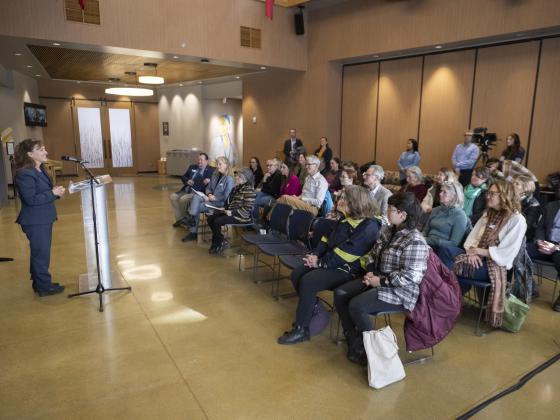BOZEMAN – At a Jan. 19 event on campus, officials from the U.S. Environmental Protection Agency announced that Montana State University will receive at least $10 million to establish a regional partnership to help communities and tribal nations in six states address environment- and energy-related priorities.
Funded by the EPA’s Environmental Justice Thriving Communities Technical Assistance Centers Program, the MSU-hosted initiative will provide resources and assistance to underserved entities, such as rural and Indigenous communities. With offices on the MSU campus, the program will employ outreach and engagement specialists stationed throughout EPA Region 8, which includes Montana, Colorado, Utah, Wyoming, South Dakota and North Dakota.
“Together, EPA and MSU will help break down the barriers to resources that underserved and overburdened communities have always faced,” said KC Becker, EPA regional administrator. “These communities deserve support and fair access to the historic levels of funding EPA offers to protect families’ health and homes.”
Julia Haggerty, associate professor in MSU’s Department of Earth Sciences in the College of Letters and Science, is serving as acting manager of the new program at MSU, which aims to start operating this spring. A resource and rural geography specialist, Haggerty has spent her career working with communities and tribal nations to identify strategies to enhance resilience and well-being as energy and natural resource markets and policies shift.
Haggerty said that the program will promote student engagement through opportunities for students to support the TCTAC’s activities as interns, part-time workers and through directed study.
“What excites me as a faculty member is that this creates an incredible opportunity to elevate our game when it comes to identifying service-learning opportunities for students as we support program participants,” Haggerty said. “Many students and faculty care deeply about doing work to improve well-being in the region. There will be tremendous opportunities for students to learn from and participate in these efforts.”
MSU’s is one of 13 regional centers being established by the EPA under the White House’s Investing in America agenda. The EPA, in partnership with the U.S. Department of Energy, selected MSU based on its ability to provide technical assistance related to energy and environmental justice, according to an agency press release.
The EPA-funded centers will provide training and other assistance to program participants in such areas as navigating federal grant application systems, developing strong grant proposals and effectively managing funding. The centers also will help identify funding opportunities and support community engagement, meeting facilitation, and translation and interpretation services. An additional focus of the program is accessing experts for consultation on technical and policy issues.
The program at MSU will use the expertise of partner agencies and organizations.
Some of them, such as the Extension programs at MSU, Colorado State University, Utah State University and the University of Wyoming, will receive funding under the five-year grant. Haggerty emphasized the prominent role of Extension programs at all the Region 8 land-grant universities in supervising the community engagement specialists assigned to their specific areas.
“The specialists – five new positions in total – will connect the knowledge and leadership in Region 8 communities with resources to empower local solutions,” she said. “There are currently many funding opportunities to address environmental and energy problems, but those opportunities can fly by underserved communities, where resources needed to apply and manage those funds are stretched thin by existing priorities.”
In keeping with its commitment to improve lives and communities, MSU Extension will use its expertise in community vitality and community-based leadership for the benefit of rural and tribal communities, said Cody Stone, Extension executive director.
MSU’s approach engages the Montana IDeA Community Engagement Core, which works to foster and enhance tribal and rural community partnerships to mitigate health disparities and enhance health equity, and the expertise of faculty and staff across the university.
The Colorado State University Center for Environmental Justice is serving as the executive co-lead alongside MSU. Also funded at CSU are the Center for the New Energy Economy and the Prevention Research Center.
Funded partners not affiliated with any of the land-grant schools in the region are the Alliance for Tribal Clean Energy and The Center for Social Creativity.
Other partner organizations include the Extension programs for North Dakota State and South Dakota Stateuniversities; the Milken Institute Community Infrastructure Center; Environmental Partners Network; Just and Equitable Transition Network; National Renewable Energy Laboratory; Green Latinos; Save Energy Coalition; and Resources Legacy Fund.




